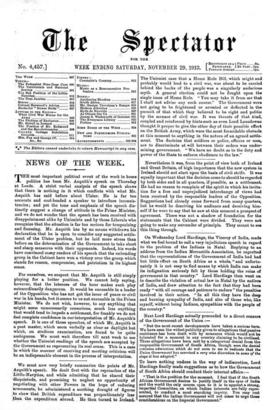We must now very briefly summarize the points of Mr.
Asquith's speech. He dealt first with the reproaches of the Little-Navyites, and while admitting that he shared their disquietude, and promising to neglect no opportunity of negotiating with other Powers in the hope of reducing 'armaments; he administered a soothing draught of figures to show that British expenditure was proportionately less than the expenditure abroad. He then turned to Ireland. The Unionist case that a Home Rule Bill, which might and probably would lead to a civil war, was about to be carried behind the backs of the people was a singularly audacious myth. A general election could not be fought upon the single issue of Home Rule. " You may take it from me that I shall not advise any such course." The Government were not going to be frightened or arrested or deflected in the pursuit of that which they believed to be right and politic by the menace of civil war. It was threats of that kind, coupled and reinforced by hints such as even Lord Lansdowne thought it proper to give the other day of their possible effect on the British Army, which were the most formidable obstacle at this moment to anything in the nature of an agreed settle- ment. The doctrine that soldiers or police, officers or men, are to discriminate at will between their orders was under- mining government. " We have no doubt as to the duty and power of the State to enforce obedience to the law."


















































